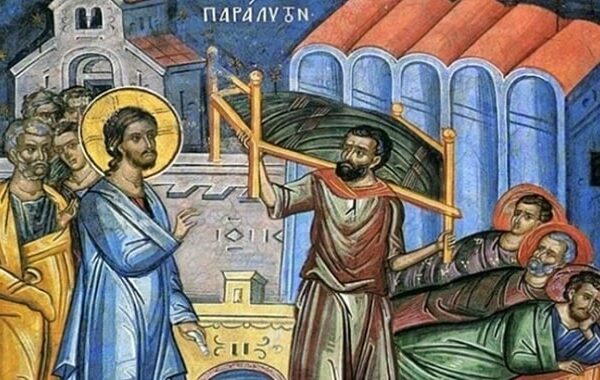Do we have the patience of the paralytic?
8 May 2023Christ has risen!
For a few more days, we’ll be saying ‘Christ has risen; He has risen, indeed’ in our everyday exchanges. But we’re called upon to live the event of the resurrection on a daily basis in our heart and in our life.
Today, the Evangelist of love, Sant John, transports us in our minds to the pool near the Sheep Gate, which in Hebrew was called Bethesda. A multitude of people used to go to this pool if they had an illness, such as blindness, paralysis and so on. They’d wait for the waters to stir in order to enter the pool. From time to time, an angel of the Lord would descend to the place and disturb the waters. The first invalid to enter thereafter would be released from their sickness; they’d find the longed-for cure they’d been seeking.

Among the host of sufferers there, was a man who’d endured his ailment for 38 years: he was paralyzed. It was the sabbath and Jesus went up to Jerusalem. No sooner did he see the paralytic than, knowing full well how long he’d been there, he asked him: ‘Do you want to become well?’. The paralytic replied: ‘Sir, I have no-one to put me into the pool when the water is disturbed, and, while I am going, another steps down before me’. Jesus told him: ‘Arise, take up your pallet and walk’. From that very moment, the paralytic became well.
This healing was performed on the sabbath day, the holy day of the Jews, and the latter were furious with him (that is, the paralytic). They demanded to know who the man was who’d told him to get up and walk, but the paralytic didn’t know Jesus’ name because he’d left. After all this, Jesus while in the temple found the man he’d cured, and said to him: ‘See, you’ve become well. Sin no more, lest worse befall you’. The man left and declared that Jesus was the one who’d healed him.
In this Gospel reading, what’s worth noting is the patience of the paralytic. He’d waited thirty-eight long years to find his cure. He waited with fortitude until he became well. But he also tried to do what he could, with what little strength he had. We saw him in the Gospel, trying to enter the pool, but others came and got there first. This wasn’t enough, however, for him to cease his efforts at finding a cure. He didn’t despair and didn’t give up hope, despite his ‘failures’.
And so, we come to today. We come to our own life and actions.
Do we show the patience demonstrated by the paralytic? Do we continue our efforts in the face of adversities, or do we give up?
Can we, who are incapable of waiting a few days, endure thirty-eight years of waiting, as the paralytic did?
We haven’t practiced patience. When we want something, we want it here and we want it now. And if we don’t get it, we despair and are disappointed.
If we don’t manage to do something, we give everything up. We give up on life. If we sin, we remain stuck there and don’t bother to start again. In life, however, we’ll fall 1000 times; and we should get up 1001. We should be fighters, do what we can and then Christ will come and do what’s impossible for us to do on our own.
We stop trying and fall into despair, because we rely on people instead of God. We depend on people we think will help us, but they don’t. Then we despair. Everything before us looks dark and black. This is an opportunity to rely on God. To depend on him who was crucified for us and gave us the resurrection. He made us sharers in his own resurrection.
In conclusion, let’s look at the example of the paralytic. He waited so many years to be cured, but didn’t despair even for one day. He was cured, not by people, but by God himself. We, too, should rely on the risen God and hope in him. It’s enough that we should make our own, small effort and he’ll do the rest.






